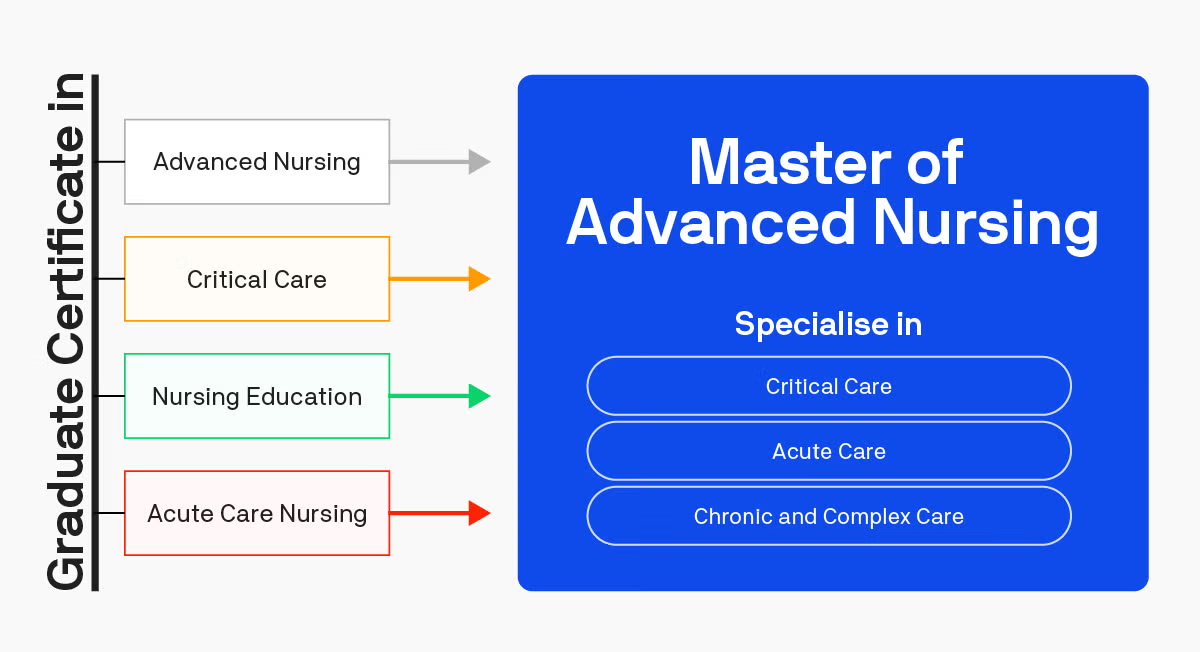Why study the Master of Advanced Nursing with UTS Online?
Top 100 University Globally1
Ranked #1 in Australia for Academic Reputation in Nursing and Midwifery2
Top ranked for Excellence in Research in Australia for Nursing & Midwifery2
5 star rated for excellence across 8 categories3
1QS World University Rankings, 2026. 2 QS World University Rankings by Subject 2024 3 QS Stars Rating 2021–2024
Drive better outcomes for person-centred care
Australia’s ever-evolving health care system is under pressure with resource constraints, policy reform and an ageing population with multiple comorbidities. Our nurses need to be ready to “step up” and take advantage of these opportunities. The need for nurses with advanced skills has never been higher, for example, Seek predicts the demand for Nurse Unit Managers will increase by 23% by 2030.
UTS Online’s Master of Advanced Nursing is designed for nurses who want to drive better outcomes for person-centred care in a range of health care settings. This course is delivered 100% online and influenced by strong healthcare industry partners, making it one of the most contemporary and comprehensive courses of its kind.
Who is this course for?
UTS Online’s Master of Advanced Nursing is designed for nurses who want to drive better outcomes for person-centred care in a range of healthcare settings. You’ll learn advanced skills applicable to different healthcare settings and can choose to major in Acute Care, Chronic and Complex Care, and Critical Care. There is also an option to choose a Flexible major.
The course is delivered part-time, 100% online and is influenced by strong healthcare industry partners, making it one of the most contemporary and comprehensive courses of its kind. It’s delivered through an innovative learning platform you can access anywhere you have an internet connection.
See entry requirements under course information for more eligibility information.
What you will study
The UTS Online Master of Advanced Nursing comprises 12 online subjects (72 credit points (CP) in total).
You can choose to pursue one of the specialisation pathways outlined below or opt for a general core pathway, complemented by additional electives to meet the total credit points required for the course.
Complete all of the following subjects:
- Specialty Clinical Practice
- Applied Pathophysiology in Practice
- Evidence for Informing Practice
- Advanced Professional Practice
- Research in Health
- Leading Health and Social Care
- Improving Safety and Quality in Healthcare
- Comprehensive Physical Assessment and Diagnostic Reasoning
Note: Most UTS Online subjects are valued at 6 credit points each. For detailed subject descriptions and further information, please download a course guide.
Flexible course options
The Master of Advanced Nursing comprises 12 online subjects (72 credit points (CP) in total).
Students who complete the Graduate Certificate in Advanced Nursing, Graduate Certificate in Acute Care Nursing, Graduate Certificate in Critical Care or the Graduate Certificate in Nursing Education may qualify to advance to the Master of Advanced Nursing, requiring only 8 additional subjects to complete the Master's degree.
Students who complete 8 subjects (48 credit points) may be eligible to exit with a Graduate Diploma in Advanced Nursing.
Graduate Certificate
4 Subjects | 8 months
Or continue studying
Graduate Diploma (exit only)
+4 Subjects | 16 months
Or continue studying
Master's
+4 Subjects | 24 months
Graduate with a Master's degree
One of our Student Enrolment Advisors can assist you with more information, including alternative pathways.
Study pathways
The School of Nursing and Midwifery offers 4 online Graduate Certificate courses – the Graduate Certificate in Advanced Nursing, the Graduate Certificate in Acute Care Nursing, the Graduate Certificate in Critical Care and the Graduate Certificate in Nursing Education – that articulate into the Master of Advanced Nursing.
This provides you with the opportunity to choose a specialisation pathway that is most aligned with your career goals.
Choose your own study path
Tailor your degree with a specialisation from the list below. A general option with no specialisation is also available.
Acquire the fundamentals to excel in diverse clinical roles, comprehensive assessment, diagnosis, and quality care.
You will learn:
- Clinical transition skills
- Person-centred care
- Medication safety competence
- Acute care expertise
Specialise in high-demand sectors for success in one of Australia's fastest-growing fields.
You will learn:
- Chronic disease burden analysis
- Self-management strategies
- Health promotion and literacy
- Determinants of health
Master expert nursing knowledge and complex patient data for confident clinical decisions.
You will learn:
- Core critical care concepts
- Evaluation of complex patient data
- Manage life-threatening conditions
- Person-centred care
Learning outcomes
Lead innovative and evidence-based nursing practice
Critically evaluate emerging research, healthcare policies and clinical guidelines to drive evidence-based practice. Implement innovative solutions to improve patient care and enhance healthcare system efficiency.
Enhance clinical leadership and decision-making
Develop advanced leadership capabilities to influence healthcare outcomes. Strengthen your ability to manage complex clinical situations, make data-driven decisions and lead teams with confidence.
Advocate for ethical and person-centred care
Apply ethical frameworks and culturally responsive approaches to nursing practice. Champion inclusivity, equity and patient advocacy in diverse healthcare settings to enhance quality and safety.
Advance healthcare through education and interdisciplinary collaboration
Build expertise in educating and mentoring healthcare professionals. Collaborate across disciplines to shape nursing practice, influence policy and drive positive change in healthcare systems.
Course information
Applicants must have the following:
- Completed Australian bachelor's degree or higher qualification, or overseas equivalent, in nursing
AND
- Current registration as a Nurse in Australia (AHPRA) OR For international applicants, current registration as a Nurse in their home country or place of residence, current Authority to Practise, and proof of current registration as a nurse with an International regulatory body – International Nurse Regulator Collaborative Website | NCSBN
AND
- A minimum of 1 year full-time, or equivalent part-time, post-registration clinical experience
AND
- Evidence of concurrent employment as a Registered Nurse in, or access to, the chosen/relevant clinical area of study.
Applicants’ current nursing registration are confirmed via the National Register of Practitioners. Applicants should ensure that details of their registration are up to date on this register.
Supporting documentation to be submitted with the application
For applicants who need to demonstrate professional work experience:
- Curriculum Vitae AND Statement of Service in one of the following formats:
- A 'Statement of Service' provided by the employer
- A completed 'UTS statement of service’ signed by the employer
Applicants who do not meet the criteria above should consider applying for the Graduate Certificate in Advanced Nursing.
Eligibility for admission does not guarantee an offer of a place.
Want to check your eligibility?
Not only do we have the right tools and support teams to help you – we have people who care about your success.
Career outcomes
The UTS Online Master of Advanced Nursing prepares registered nurses to step into leadership roles and drive meaningful change in healthcare. This course equips you with advanced clinical knowledge, leadership skills and the ability to improve patient outcomes in diverse healthcare settings.
Upon completion, graduates can explore a range of career opportunities, including:
- Nurse Unit Manager
- Clinical Nurse Consultant
- Clinical Nurse Specialist
- Nursing Educator
- Nurse Researcher
$125,000
Average salary
Nurse practitioners in Australia earn an average annual salary of $125,000, showcasing the financial benefits of advanced nursing qualifications.
(Indeed)
70,000 +
Shortfall by 2035
Australia is expected to face a shortage of over 70,000 nurses by 2035, underscoring the urgent need for skilled nursing leadership and education.
(Australian Nursing & Midwifery Journal)
15%
of the workforce in Healthcare
Healthcare and social assistance make up 15% of Australia’s workforce, highlighting the growing demand for nurses in this essential sector.
(Australian Bureau of Statistics)
Upcoming intakes
UTS Online courses have 6 intakes per year. The diagram below shows all upcoming intakes. Our next intake is highlighted below.
-
Jan
2026 -
Mar
2026 -
May
2026 -
Jun
2026 -
Aug
2026 -
Oct
2026
Meet our Course Director
“Pursuing postgraduate study at the University of Technology Sydney (UTS) offers nurses a unique opportunity to advance their knowledge and skills in a dynamic and supportive environment. UTS is ranked #1 in Australia for academic reputation in nursing and midwifery, and its postgraduate programs are designed in close consultation with industry partners to ensure graduates are equipped with in-demand, evidence-based skills that meet the evolving needs of the health sector. The curriculum is highly customisable, enabling students to tailor their learning to specific interests and career goals, with options to mix and match majors, sub-majors, and electives. Courses are delivered flexibly online, allowing nurses to balance study with professional and personal commitments. With a strong emphasis on person-centered care, research excellence, and real-world application, UTS postgraduate nursing graduates are well-prepared to drive better patient outcomes, step into advanced practice or leadership roles, and make a meaningful impact in healthcare—locally and globally.”
Professor Jacqui Pich
Deputy Head of School (Teaching and Learning)
What our students are saying
"We need nurse leaders who are ready to push and change things for the better. We also need to be on top of digital disruption and innovation. Nurses are in many ways at the forefront of this transformation. They’re experiencing an increasing demand for personalised, accurate, real-time health data and delivery of remote healthcare. To do that, nurses need to continually upskill to stay up-to-date and drive healthcare innovation and this degree has helped me develop skills to do just that."
Audrey B
UTS Online Graduate
Download a course guide
Download a course guide to explore detailed subject descriptions, entry requirements, pathway options and fee information.
Frequently asked questions
Yes, you must hold current registration as a nurse in Australia.
Please visit the Graduate Certificate in Advanced Nursing, Graduate Certificate in Critical Care, Graduate Certificate in Nursing Education, and Graduate Certificate in Acute Care Nursing course pages for specific information about entry requirements for each course.
Generally, you are required to demonstrate one year of post-registration clinical experience to enrol in the Master of Advanced Nursing. Pro-rata, this is equivalent to 1800 hours. In some circumstances, the Faculty may assess your work experience and capability on a case-by-case basis.
Absolutely! At UTS Online, we offer a range of specialisations within our Master of Advanced Nursing.
You can choose from five specialisations, allowing you to focus on the area of nursing that aligns best with your career goals and interests. This customisation empowers you to tailor your education to meet your specific needs and aspirations. These include Acute Care, Chronic and Complex Care and Critical Care.
A general option with no specialisation is also available.
If you're unsure which specialisation aligns best with your aspirations, don't hesitate to contact our Student Enrolment Advisors. They are here to support you in making the right choice for your future. Schedule a call at this link or reach out to us on live chat.
Absolutely!
We understand that your journey in nursing education is unique. That's why UTS Online offers you the opportunity to build upon your existing qualifications. For instance, if you completed a Graduate Certificate in Critical Care, you can continue your academic journey by articulating into the Master of Advanced Nursing with a specialisation in Critical Care. We provide flexible pathways that align with your professional interests, allowing you to tailor your education to your specific needs.
Remember, we are always just an email or phone call away to help.
If you’ve completed relevant studies at AQF Level 8 or higher (such as a graduate certificate or graduate diploma), you may be eligible for Recognition of Prior Learning (RPL) towards the Master of Advanced Nursing. To find out if you qualify, reach out to one of our Student Enrolment Advisors.
While our Master of Advanced Nursing course is delivered 100% online, assessments are highly practical and often applied to your workplace. To enter the course, you are required to be employed in a healthcare setting, as you will need to utlilise your clinical environment to complete subject activities and assessment tasks.
No, placements in a hospital setting are not required when studying the Master of Advanced Nursing. However, you must already be employed as an RN in a healthcare setting to fulfil the practical components of the course.
Studying this course will equip you with the knowledge, skills and qualifications to move into leadership and advanced practice roles in your career such as a Clinical Nurse Specialist, (Clinical) Nurse Educator (or equivalent), Clinical Nurse Consultant or Nurse Unit Manager.
An advanced nurse uses higher-level clinical reasoning, contributes to complex decision-making, leads practice improvement and supports the development of other clinicians. These roles often involve coordinating patient care, contributing to clinical governance, implementing evidence-based practice and influencing quality and safety across healthcare settings.
A master’s in nursing, such as the UTS Online Master of Advanced Nursing , helps nurses develop these capabilities through advanced study in leadership, clinical practice, research and professional development.
Australia’s best nursing schools are typically recognised for strong clinical partnerships, high-quality research, experienced teaching staff and strong graduate outcomes. Rankings often consider factors such as academic reputation, research performance and the ability to prepare nurses for modern, complex clinical environments.
The School of Nursing and Midwifery at UTS is consistently recognised as a global leader in nursing education. It is ranked 3rd in Australia and 24th globally in the QS World University Rankings by Subject (2024), and #1 in Australia for Nursing and Midwifery based on academic reputation. In the Shanghai Rankings (2025), UTS is ranked #5 globally and #2 in Australia for Nursing. With more than 3,000 nursing and midwifery students enrolled across undergraduate and postgraduate study, it is one of the country’s largest and most research-active schools. UTS Online postgraduate nursing courses draw on this same academic foundation.
Nursing school rankings often reflect research excellence, industry relevance, simulation facilities, teaching expertise and the breadth of clinical partnerships. Schools that contribute significantly to workforce development and evidence-based practice tend to achieve higher ratings.
The UTS Faculty of Health is home to Nursing and Midwifery programs that hold an ERA 5/5 research rating. The school also hosts Australia’s only World Health Organization Collaborating Centre for Nursing, Midwifery and Health Development, highlighting its global engagement. UTS Online postgraduate nursing options draw from this research and industry strength.
Universities differ based on curriculum design, placement opportunities, simulation resources, academic expertise and research intensity. Some prioritise strong clinical immersion, while others focus on innovation, global partnerships or specialist areas such as acute care or mental health.
UTS combines rigorous academic training with clinical partnerships and advanced simulation facilities. Its Nursing and Midwifery school includes more than 2,500 nursing students, demonstrating both scale and depth. UTS Online nursing study is built on this same evidence-based approach, tailored for working professionals.
Universities known for postgraduate nursing typically demonstrate strong research output, offer advanced specialty pathways and maintain strong collaboration with hospitals and health services. They often support workforce needs in areas like acute care, advanced practice, clinical leadership and digital health.
UTS is consistently recognised among the world’s top nursing schools and holds a QS global ranking of 24th. With more than 450 postgraduate nursing students, UTS Online extends this by demonstrating a strong capability in flexible, postgraduate education.
Comparisons often focus on accreditation, curriculum structure, teaching quality, research performance, simulation facilities, clinical placement networks and graduate employment outcomes. Many students also consider whether a school contributes to health innovation or participates in national and international health initiatives.
The Nursing and Midwifery school at UTS publishes information on its research strengths, industry connections and global engagement, including being the only WHO Collaborating Centre for Nursing, Midwifery and Health Development in Australia. This type of information can help prospective students assess how different universities support quality nursing education.
Assignments in our subjects are authentic, relevant and often grounded in your personal clinical context. They vary according to the subject and include, but are not limited to clinical reports, posters, online quizzes and vivas (oral assessment), podcasts, recorded presentations, education tools, proposals, protocols and professional portfolios. You will not be required to complete exams or group assignments to graduate the Master of Advanced Nursing.
When you enrol in the Master of Advanced Nursing at UTS Online, you’ll experience a flexible and intuitive online learning platform. Highlights include:
-
Practical assessments designed to apply your knowledge directly to your workplace
-
Flexible schedules that fit around your professional commitments
-
Resources tailored to advanced nursing practices, including video tutorials and interactive tools
Here’s a video example showcasing key features of our online learning platform, including tools designed to enhance your study experience.
For practical tips on balancing your studies with work and life, click here to learn how to achieve your goals. Remember, our team is just an email or call away to support you every step of the way.













